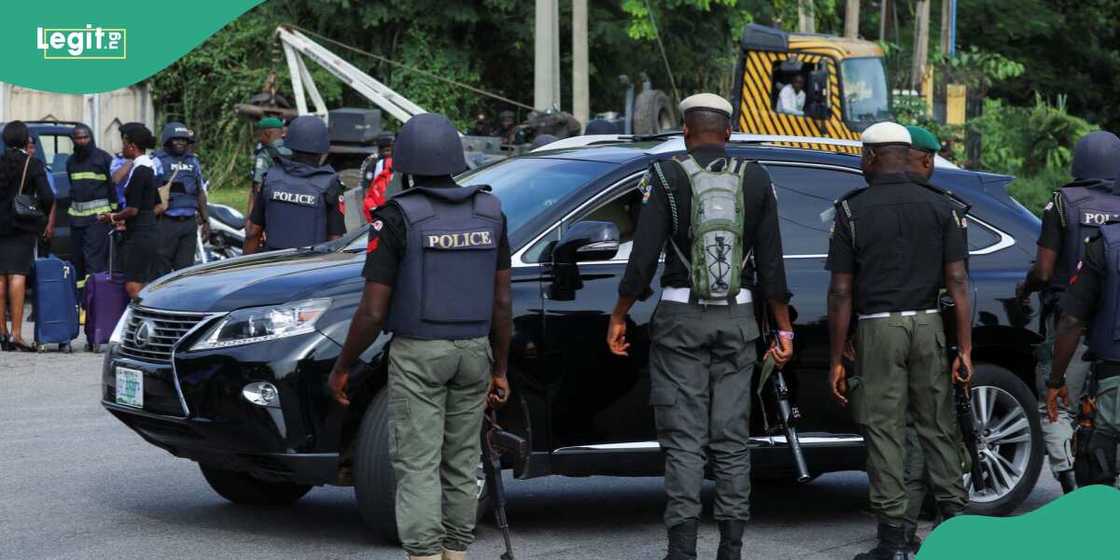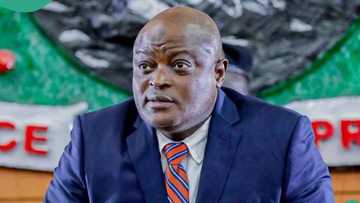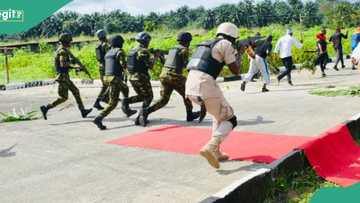“I Was Arrested for Taking Pictures of Police Officers on Duty, Is It an Offence?” Lawyer Reacts
- Operatives of the Nigeria Police Force arrested a young man (name withheld) because he took a picture of an officer on duty
- The young man who spoke anonymously was detained by the Force and later released after days in detention, but he sought to know if he committed an offence
- Barrister Olayinka Serah Ahmed, an associate attorney at First Almond Attorneys in Lagos, explained whether the arrest was within the ambit of the law
PAY ATTENTION: The 2024 Business Leaders Awards Present Entrepreneurs that Change Nigeria for the Better. Check out their Stories!
Legit.ng journalist Esther Odili has over two years of experience covering political parties and movements.
A young man who spoke to Legit.ng anonymously disclosed that police arrested him because he took photographs of officers on duty with his mobile gadgets.

Source: Facebook
"Police officers assaulted me for taking photographs of them with my mobile gadgets and arrested me.

Read also
BREAKING: Details of Tinubu’s meeting with national assembly members emerge as President complains
"I asked them, what is my offence? They kept mute until we got to the station.
"I was detained for days and I kept asking them what did I do wrong?
"Thank God I was later released but I need to know; Is it an offence to take pictures of police officers on duty?"
What is an offence? Legal expert explains
Barrister Olayinka Serah Ahmed is passionate about fundamental human rights and has experience in civil, criminal, and corporate areas of law.
The first question to tackle in this situation will be what can be termed as an offence.
An offence, according to the Section 2 of the Criminal Code Act is defined as an act or omission which renders the person doing the act or making the omission liable to punishment under this code, or under any act, or law. Invariably an offence occurs when a person trespasses against laid down rules and regulations. Oftentimes, the law looks at the intention of the accused alongside the violated law to determine whether an offence has indeed been committed.

Read also
"Diabolical and barbaric": Accord Party, Ijaw youths react to gruesome killings of soldiers in Delta
Apparently, from the meaning cited above and to buttress the point, Section 36(12) of the 1999 Constitution of the Federal Republic of Nigeria (as amended) provides thus: “Subject as otherwise provided by this constitution a person shall not be convicted of a criminal offence unless that offence is defined and the penalty therefore is prescribed in a written law; and in subsection, a written law refers to an Act of the National Assembly or a Law of a State, and subsidiary legislation or instrument under the provisions of a law.” By this, the police are charged with the sole responsibility to ensure that laid down laws are being adhered to by the citizens, and this responsibility does not entail the fact of them deciding what constitutes an offence or not.
It's not an offence to take photos of officers on duty
Over time, there have been reports of the Nigeria Police Force (NPF) tagging citizens taking their pictures or videoing them on duty as an offence. So, this raises the question: “Is it really an offence?” Well, that is what we are about to find out. According to the provisions of the law cited above, an offence is one when it is emphatically stated by any given law and a penalty is attached to it. The fact that an act is committed, and it offends the conscience of the receiver of that action does not specifically make the act an offence. It is therefore important to know that no law whatsoever has provided that taking pictures or videoing a policeman in the line of duty is an offence. In fact, members of the public could record or take pictures of the policemen for different reasons, among which are:
1. For Evidentiary Purpose: In a scenario where a citizen or another citizen is constitutionally being violated by the men of the police force during search or protest or even arrest, he or she is within the right to take pictures or video of such action as it will serve as evidence if a fundamental human rights action is eventually filled in court.
2. For Appraisal Purpose: A citizen can be impressed with the conduct and professionalism displayed by a police officer and may deem it fit to publicize it or make it trend in the media for public validation and commendations in which many officers have benefited.
3. For Precautionary Measure: The pictures and videos of the policemen can be taken where they approach any person to search his or her home, car, or office. An individual has the right, whether the policemen have a warrant or not. Similarly, it is an aberration against the civil liberty of the owner of the property in question for the Police to attempt to, or delete such videos or pictures from the media device.
However, there are few exceptions to this act, implying that there are instances where members of the public are advised to use their discretion. A few of the instances are as follows:
1. Obstruction during Arrest of Violent Suspect: There may be a situation where the police are attempting to effect an arrest of a ‘violent suspect,’ who is resisting or evading arrest, but the act(s) of a third-party videoing and taking pictures is obstructing or hampering the police in performing at their professional best, then the police are provisionally empowered to reasonably direct such person(s) to vacate the premises of arrest.
2. Malicious Intention Tendency: In a situation where the act of videoing or taking pictures is considered to have a wrong or malicious tendency, just as in the case above, such a citizen can be sued by the police authority for harassment of a public officer.
3. Timing and Peculiarity of the Event: The police can, at their professional discretion, reasonably stop or disallow an act of citizen taking pictures or video, where what is paramount at the time is to secure lives and property, but their efforts are being limited, restricted or obstructed by the action of citizen(s) engaging in media activities, the police exclusively reserve the right to stop such acts to ensure safety and security of lives and properties at that critical time.
Use your discretion, lawyer urges members of the public
In view of the above-stated points, it is advisable that members of the public ensure they activate their discretionary instincts before or while engaging in any media activities, such as their right to video or take pictures of police officers on duty. While attesting that the action is obtainable globally, nevertheless, the intention, timing, and circumstance matter. Summarily, taking pictures and videoing is not an offence; but where it is not well managed, it can result in other offence(s) known by the law.
Police arrest man in place of his fleeing brother
In a related post, a young man was arrested by the police in place of his brother, who fled from detention after being arrested for robbery.
Barrister Olayinka Serah Ahmed, a respected legal expert, provided clarity to the matter, including the right of the police to make such an arrest.
Disclaimer: The advice given in this article is general and is not intended to influence readers' decisions about solving marital problems. Readers should always seek their own professional advice that takes into account their own personal circumstances before making any decision.
Do you have a story to tell? Want an expert's advice? Please email us at ask.an.expert@corp.legit.ng with 'Ask an expert' in the subject line.
PAY ATTENTION: Stay Informed and follow us on Google News!
Source: Legit.ng






